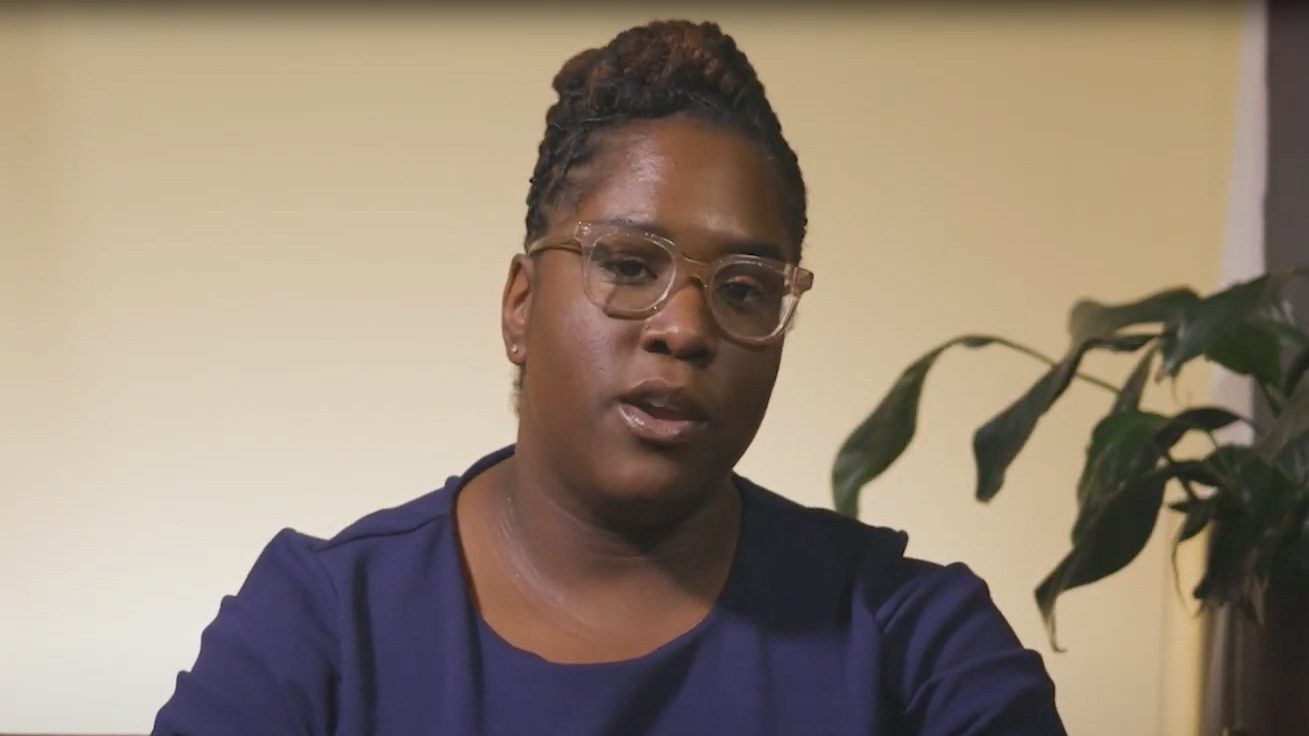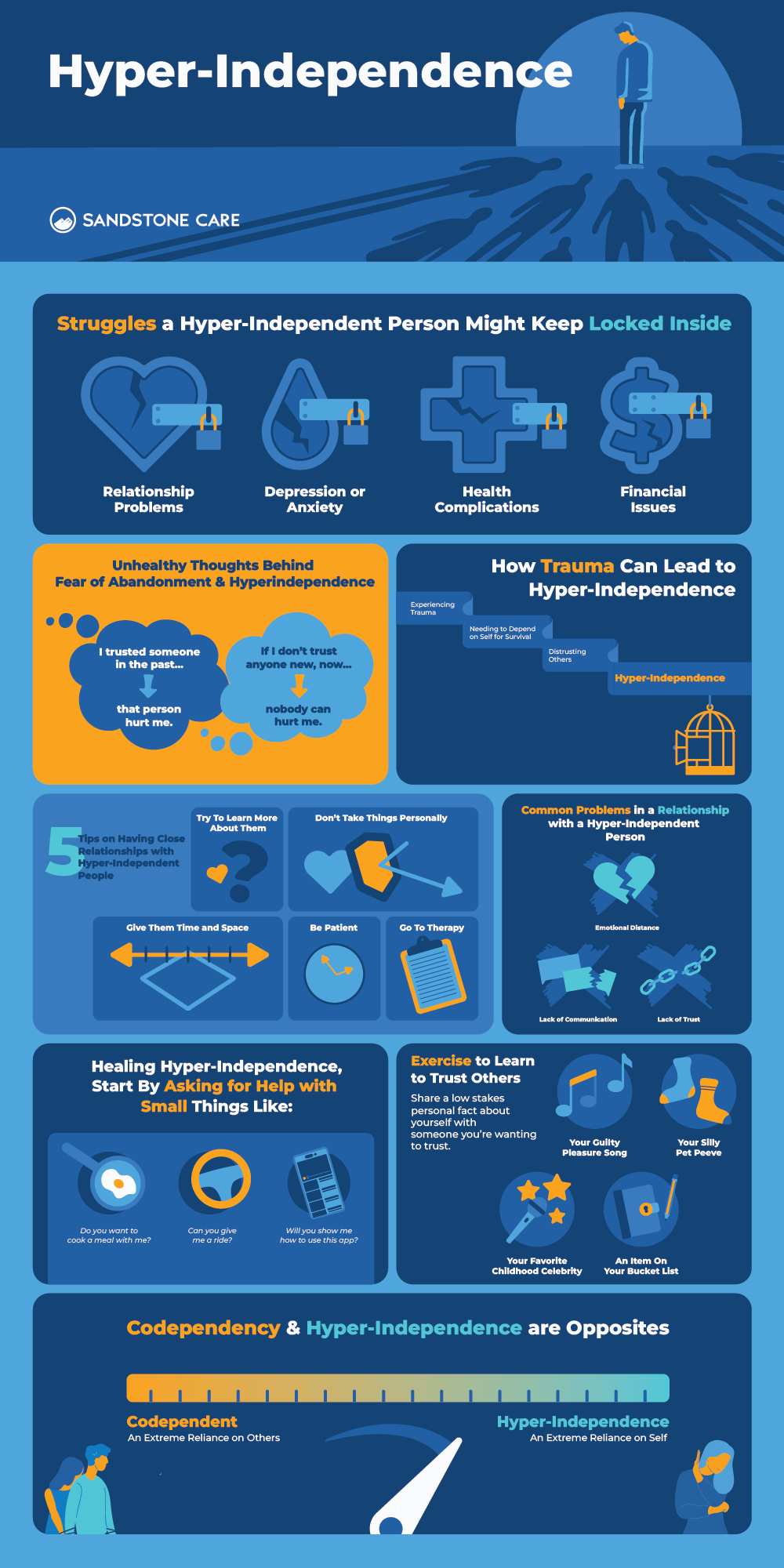Hyper-Independence
What Is Hyper-Independence?
Hyper-independence is when an individual is extremely self-reliant and avoids going to other people for support or help. It can also stem from a stress response in individuals with trauma.
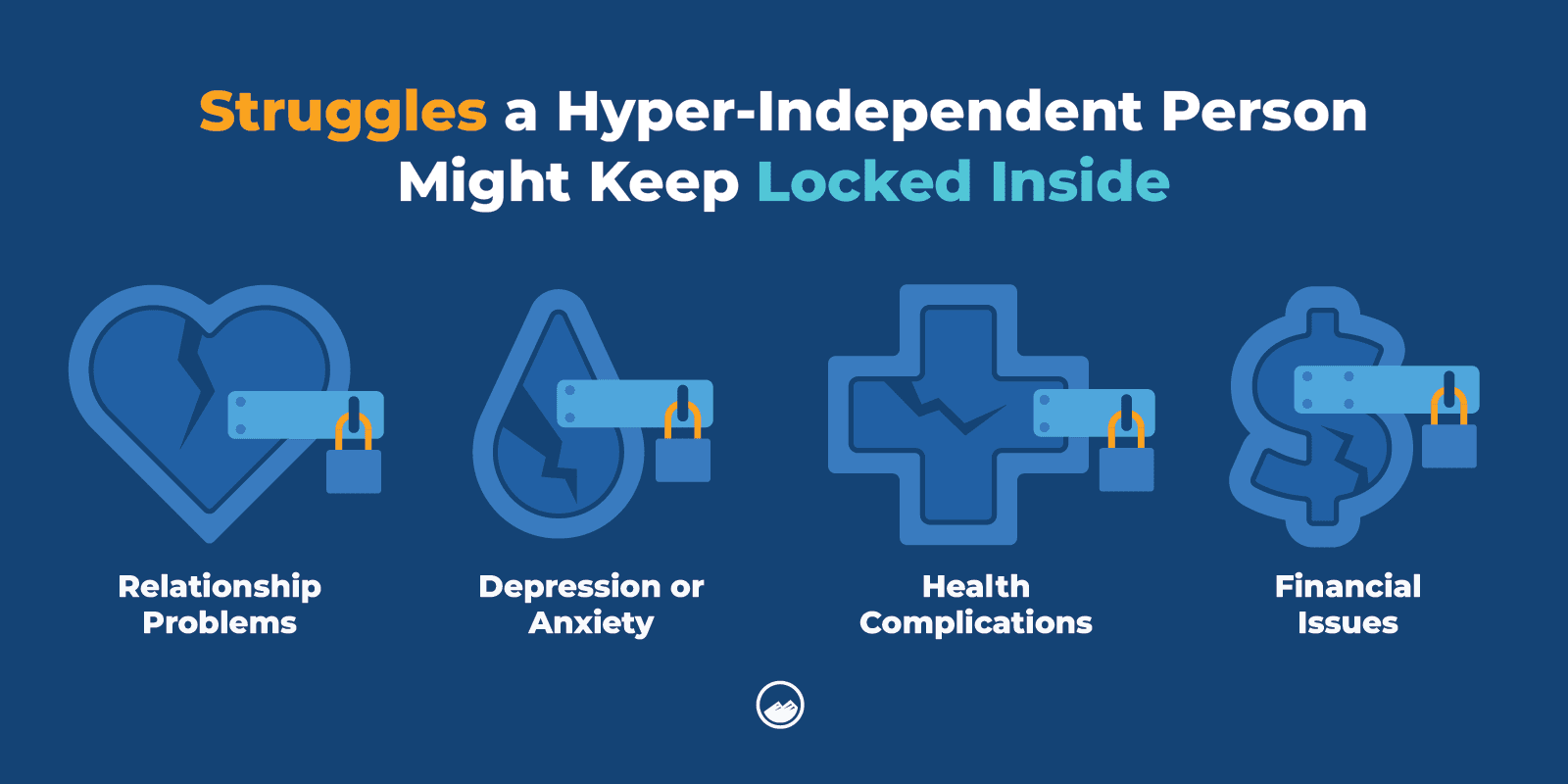
When a person is hyper-independent, it can lead to challenges not only in relationships but for their mental health and well-being as well.
What Causes Hyper-Independence?
Hyper-independence often comes from various forms of trauma.
When an individual is hyper-independent, it can stem from previous experiences such as childhood trauma, neglect, or abuse that led them to feel unsafe.
Is Hyper-Independence Bad?
Being independent is a great thing.
However, hyper-independence can have a negative impact on a person’s relationships and well-being.
When a person is hyper-independent, it can impact things like trust and communication in a relationship. It can also keep a person from reaching out for help when they really need it.
Individuals who are hyper-independent may carry a lot of weight on their shoulders because they feel like they cannot trust or rely on anyone but themselves.
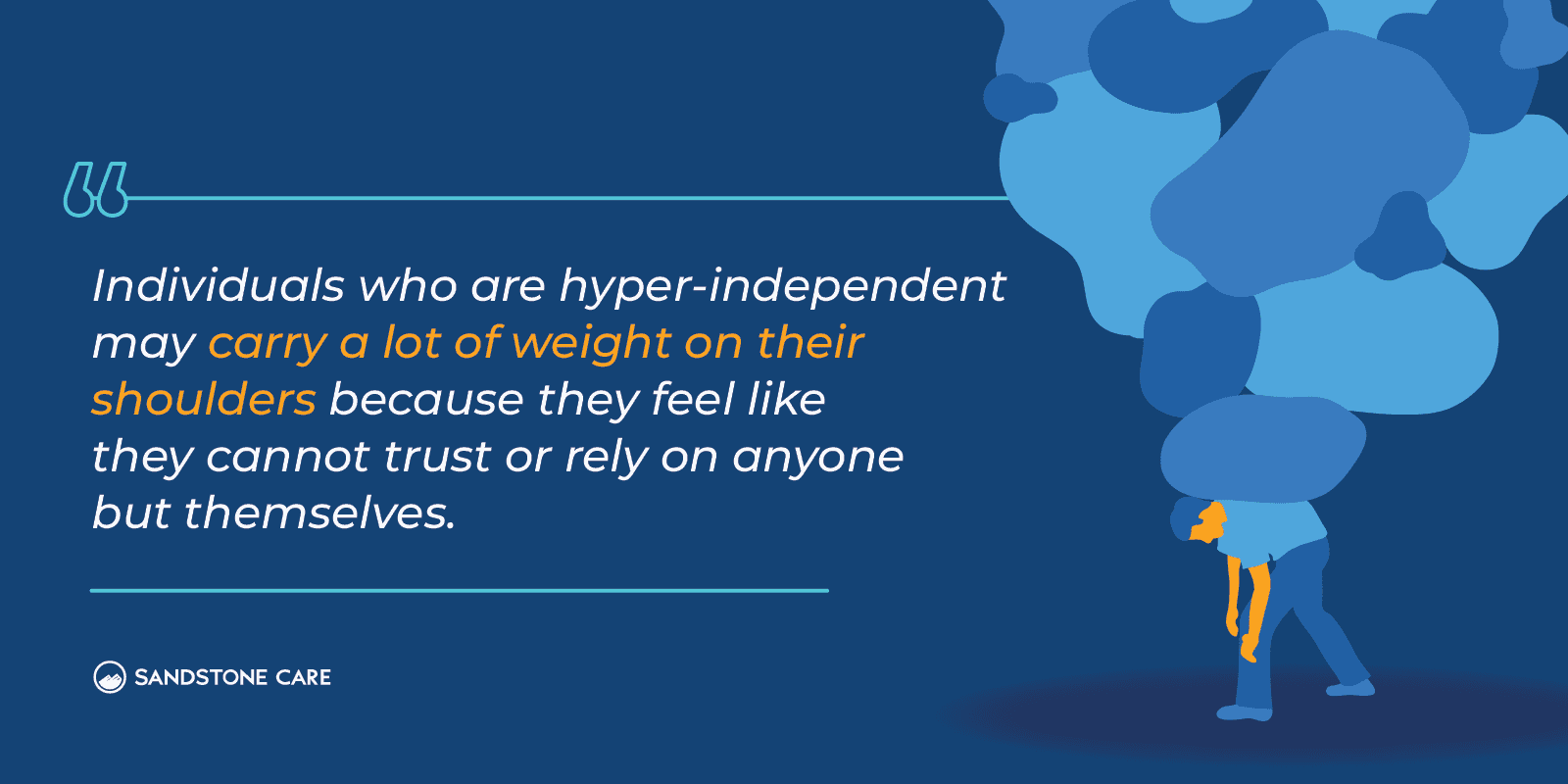
If a person is hyper-independent, it is important to get to the underlying cause of it to understand why they feel, think, or act the way they do and learn ways to cope and restructure their beliefs.
What Are the Benefits of Hyper-Independence?
One of the benefits of hyper-independence is that, in some cases, it serves as a way for an individual to protect themselves and keep themselves safe.
If they have relationships that are unhealthy or unsafe, being hyper-independent may help them disconnect from them and create their own space.
However, even in these cases, it is important for the hyper-independent individual to know that they are not alone and that there are people to help and support them.
What Is an Example of Hyper-Independence?
An example of hyper-independence is when a person wants to be completely reliant on only themselves and does not want to ask for help or depend on anyone for anything.
For example, a hyper-independent person may have no desire to form any connections or relations with others and may live alone, go to work, and spend most of their time alone.
Even if they are going through something mentally or facing a challenge in their life, they will not ask for help.
It is important to note that just because a person likes to spend time on their own a lot doesn’t mean that they are hyper-independent.
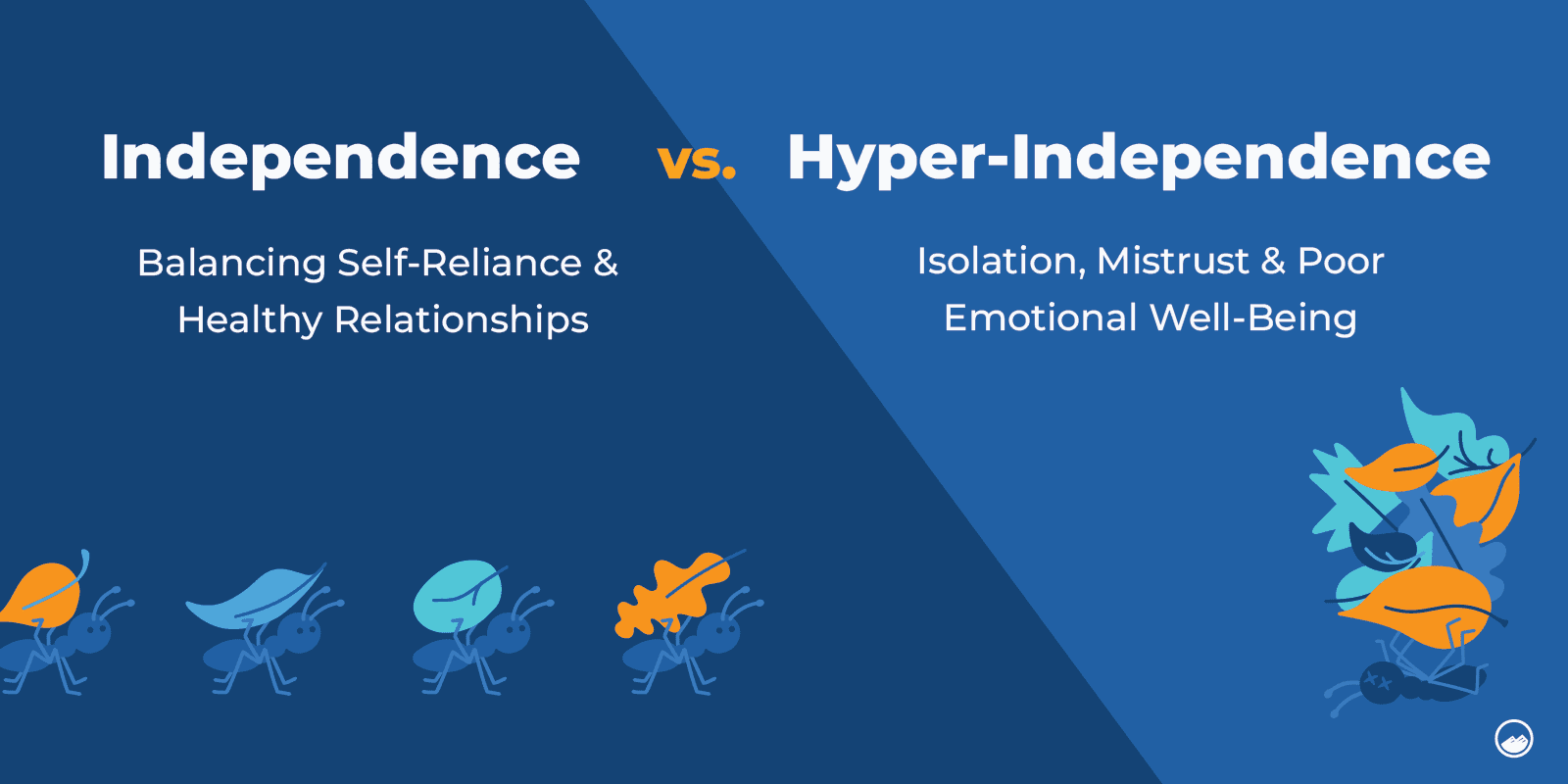
Signs of Hyper-Independence
What Are Signs of Hyper-Independence?
Some of the common signs of hyper-independence can include:
- Mistrust in others
- Perfectionism
- Avoiding dependence on others
- Little to no close relationships
- Not wanting to ask for help
- Anxiety and depression
- Taking on too many responsibilities
- Stress and burnout
- Difficulties in relationships
Am I Hyper-Independent?
Being independent is a great and normal part of transitioning into adulthood.
Just because someone lives alone, likes to spend time alone, and may not be in a relationship doesn’t mean they are hyper-independent.
If you feel that you do show signs of hyper-independence or if you have had past traumas that you never really addressed, it is important to reach out for help, even if it is directly to your healthcare provider or a mental health professional.
Hyper-Independence Trauma Response
What Is Emotional Hyper-Independence?
When a person is emotionally hyper-independent, they feel the need to handle everything in their life on their own, including their own emotions and challenges.
Being emotionally hyper-independent can put a lot of weight on one person, especially because they can go through difficult feelings but feel that it is not a choice to ask someone for help.
Is Hyper-Independence a Trauma Response?
Hyper-independence can form as a trauma response.
Individuals who have experienced trauma may have had people in their life that emotionally or physically abused them, didn’t meet their emotional needs, risked their safety, or were unreliable or absent.
These things can cause a person to depend on themselves to survive and make them feel that they cannot trust or rely on anyone else.
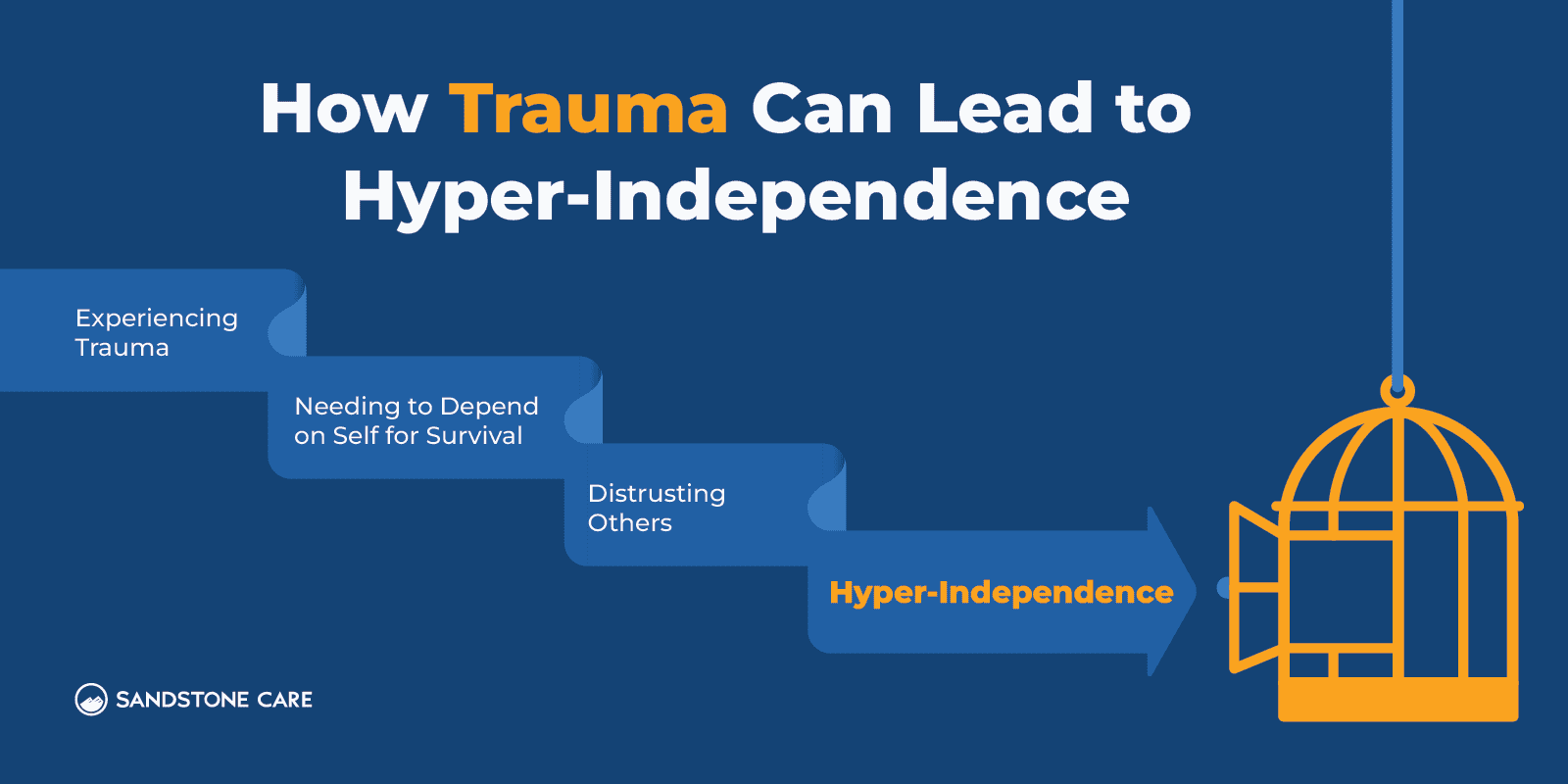
What Trauma Causes Hyper-Independence?
Individuals who have experienced trauma such as neglect or abuse, especially in their childhood, may become hyper-independent as a trauma response.
What Are Hyper-Independence Trauma Symptoms?
Some of the most common hyper-independence trauma symptoms include:
- Feeling shame if they have to ask someone for help
- Isolation
- Depression
- Feeling unworthy or undeserving of support
- Anxiety or high-functioning anxiety
- Thoughts of self-harm
- Substance abuse
Is Hyper-Independence a Mental Illness?
Hyper-independence is not considered a formal diagnosis and is, rather, a trauma or stress response.
Is Hyper-Independence PTSD?
Hyper-independence can stem from PTSD when a person goes through a traumatic experience and then learns or feels that they cannot trust others or rely on anyone else.
What Is Hyper-Independence Fear of Abandonment?
Individuals with hyper-independence may have a fear of abandonment, often because someone in the past was absent or abandoned them.
Because of this fear, they might avoid building close relationships with others in order to minimize or prevent the chance of the person abandoning them.
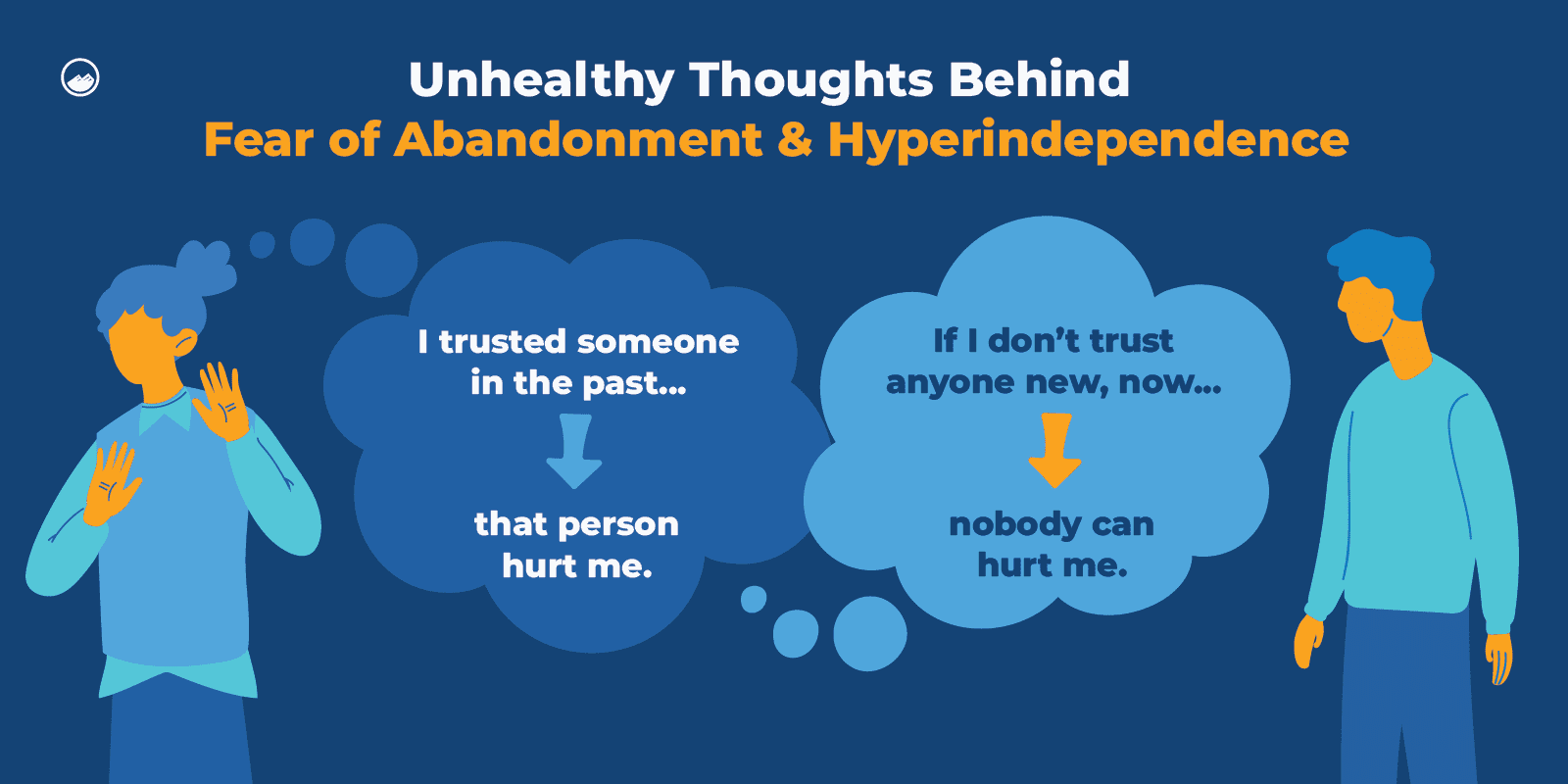
Is Hyper-Independence a Coping Mechanism?
Hyper-independence can be a coping mechanism for stress or trauma.
If a person has learned distrust or a lack of feelings of safety from past relationships, hyper-independence can be a way to cope with this and protect themselves from getting hurt.
Hyper-Independence in Relationships
How to Help Someone With HyperIndependence?
If you think you might be hyper-independent, therapy can help provide a safe space where a person can address and process their experiences, learn to build trust and learn healthy coping mechanisms.
Helping someone with hyper-independence might mean checking in on them and letting them know you are there when they need you. You can help reassure them that you are there for support without being overwhelming or overbearing.
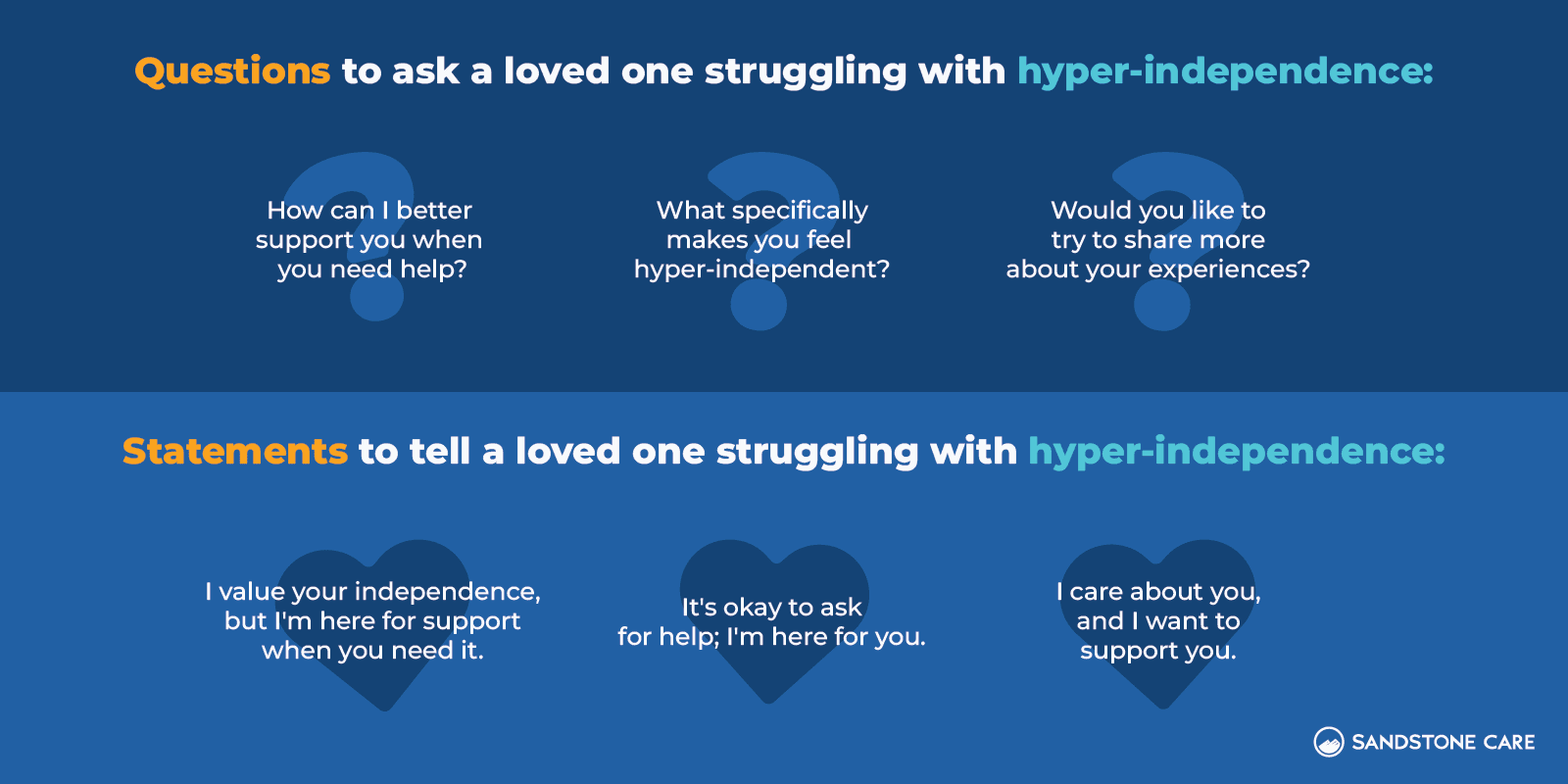
You can also ask them how you can be more supportive. Everyone is different, and so are their needs. Being patient and building trust together over time goes a long way.
Is Hyper-Independence Codependency?
Codependence is often seen as the opposite of hyper-independence.
When a person is codependent, they focus their life on the needs and wants of the other person in the relationship, but these relationships are one-sided and imbalanced.
With codependency, the person often feels that they only have purpose or value inside the relationship and not in their life outside of the relationship.
Can You Be Codependent and Hyper-Independent?
Often, when a person is codependent, they find a hard time being independent.
Individuals in a codependent relationship can commonly feel that they either have to depend fully on the relationship and the other person in it or that they have to leave and be hyper-independent and alone.
This kind of thinking can make it hard for a person in a codependent relationship to get out of an unhealthy relationship or build healthy relationships.
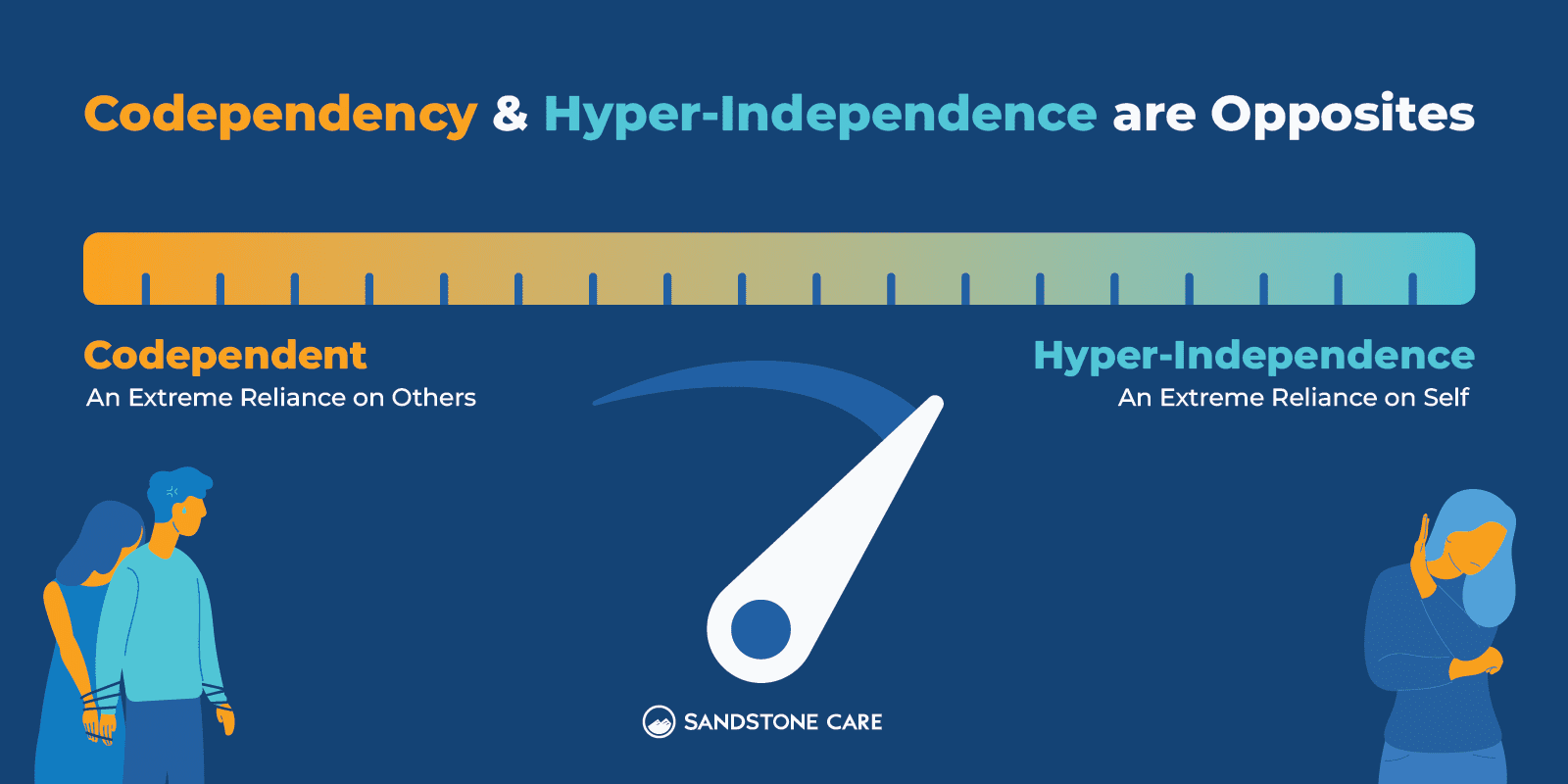
How Do You Love Someone Who Is Hyper-Independent?
Having someone close to you who is hyper-independent can bring up some challenges, whether you are a family member, friend, or partner.
A few things you can do in relationships with someone who is hyper-independent, whether romantic or familial, include:
- Giving them time and space when they need it
- Not taking things personally
- Have clear and open communication
- Be patient and try to learn more about the other person
- Learn how to navigate and address the underlying cause
- Go to therapy, individually or together
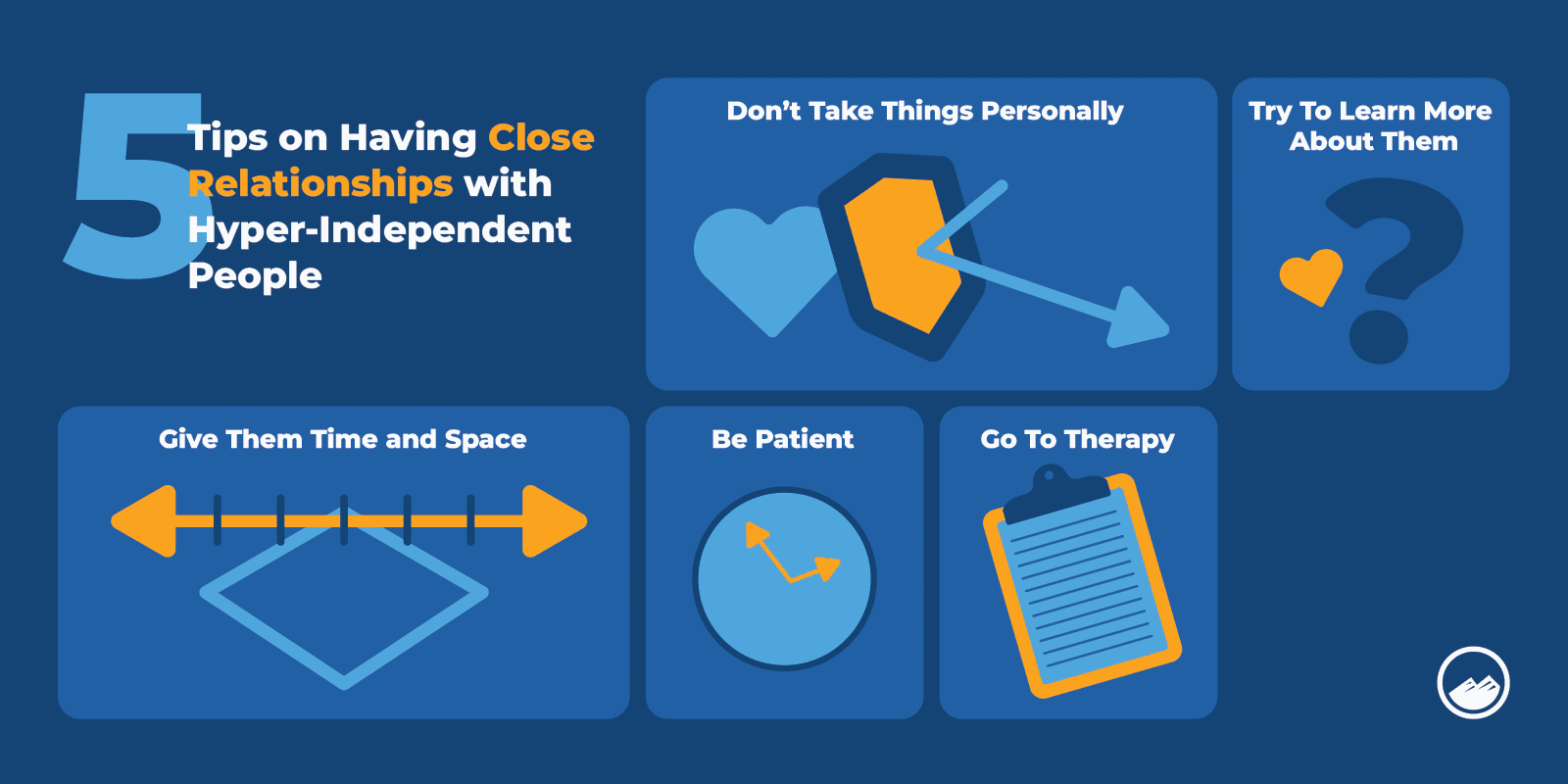
How to Date a Hyper-Independent Person?
Dating and being a partner to a hyper-independent person requires more considerations than some other personal relationships.
Partnerships require more intimacy than other personal relationships, and it can be difficult to get to that level when one person in the relationship is more closed off.
When dating a hyper-independent person, it can be hard to connect on a deeper level because there may be emotional distance between you and them, and it can be hard for them to open up or trust another person.
Some things to keep in mind if you are dating a hyper-independent person can include:
- Being patient and taking the time to get to know them
- Having open and honest communication
- Offering trust and reassurance through both your words and actions
- Let them have their own time and space
- Respect their choices
- Avoid playing relationship “games”
- Accept the person as they are
Can Being Too Independent Ruin a Relationship?
Being independent is a great thing, and having your own time, identity, and purpose in a relationship is important.
However, being hyper-independent in a relationship can lead to challenges such as emotional distance, lack of communication, lack of trust, and other problems.
Sometimes, when a person is hyper independent in a relationship, they might be emotionally unavailable, causing both people to feel disconnected and find it hard to build their relationship.
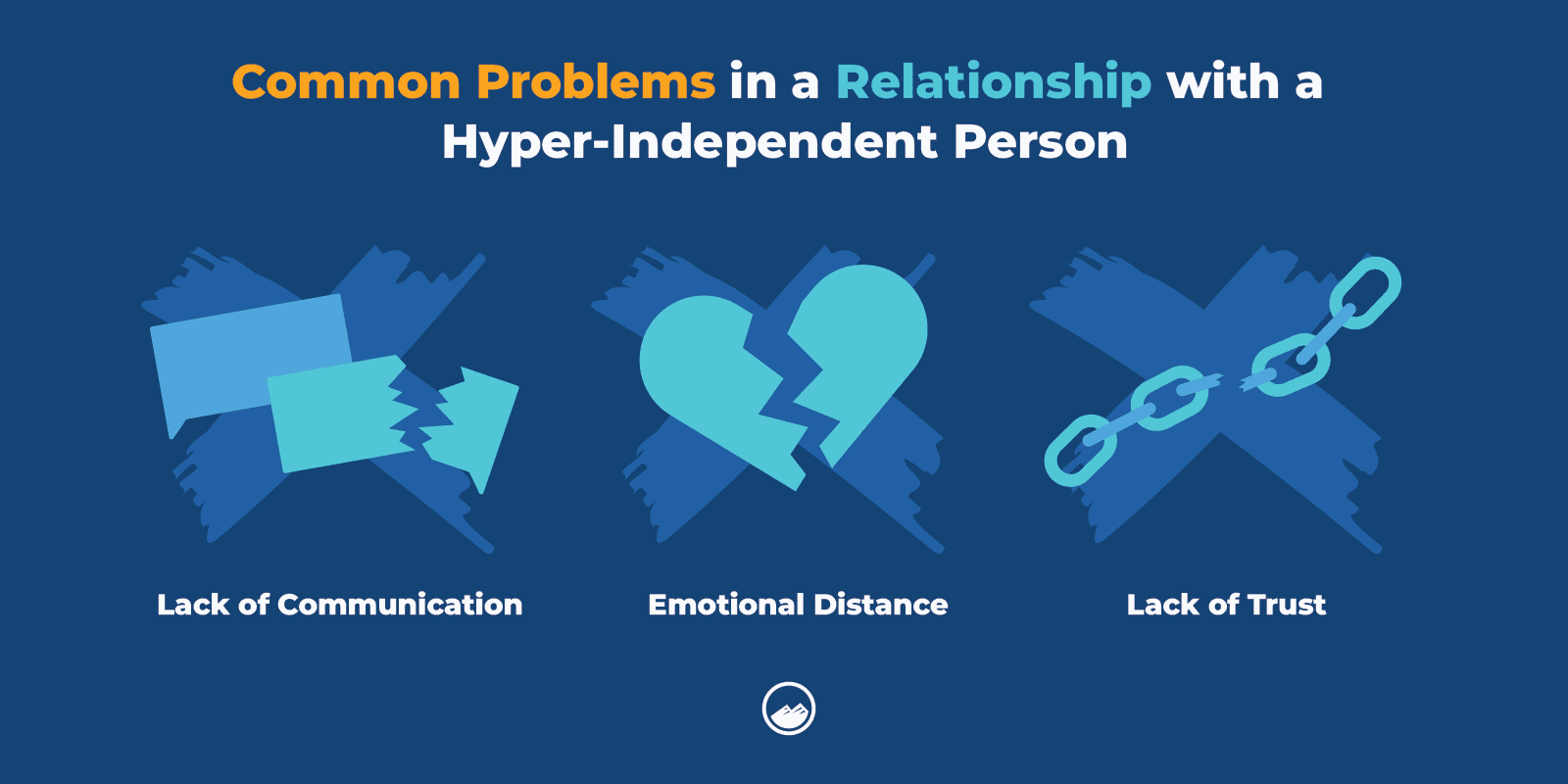
Overcoming Hyper-Independence
How to Treat Hyper-Independence
Treating hyper-independence involves understanding the root cause.
Hyper-independence may be triggered as a stress or trauma response, so treating hyper-independence means addressing the underlying stress or past trauma.
Getting to the root cause of hyper-independence often involves therapy.
Cognitive behavioral therapy (CBT) is one of the most common forms of psychotherapy used to help individuals with a wide range of different mental health conditions get to the root cause of their problems and learn new ways to cope and restructure their thoughts and behaviors.
Trauma-focused cognitive behavioral therapy can also help children, adolescents, or young adults with post-traumatic stress disorder (PTSD) and other mental health challenges.
Other ways to manage hyper-independence outside of therapy or on your own can include:
- Practicing self-care
- Learning how to be vulnerable
- Self-reflection
Individuals who are hyper-independent often don’t want to ask for help or feel like they can’t. If you or a loved one are hyper-independent, know that it is okay to ask for help and that there is support out there for you that you can trust.
How to Learn to Ask For Help
Learning to ask for help can be a great challenge for individuals who are hyper-independent.
Some steps to take in learning to ask for help can include:
- Identifying what beliefs are preventing you from asking for help
- Try to start by helping others
- Know what you want to ask and who you want to ask for help
- Reflect on yourself and what makes you feel the way you do when you ask for help
- Try asking for help with small things first
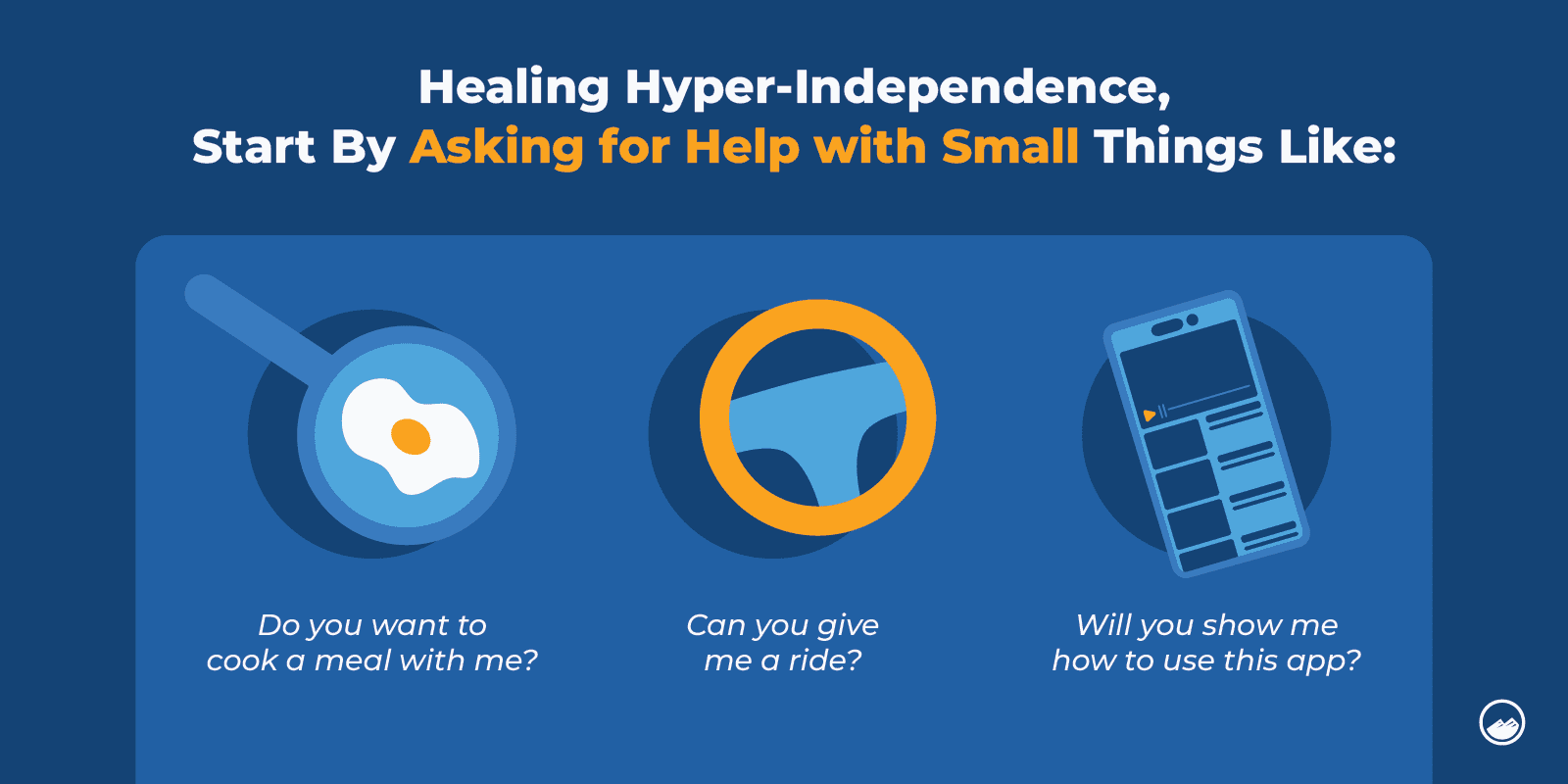
Asking for help is not a sign of weakness. When learning how to ask for help, remind yourself that it is okay and good to ask for help when you need it, even though it is hard.
People who are hyper-independent may have a hard time trusting others, and it can be hard to ask for help when you feel like you can’t trust anyone. Try opening up more conversations with the people close to you to help build your trust so you feel more comfortable asking for help.
If you don’t feel like you have anyone, you can ask for help or reach out for professional support, like your healthcare provider, a licensed therapist, or another mental health professional.
How to Rely on Someone
When a person goes through a traumatic event or has had past experiences where they learned they can’t trust or rely on someone, it can affect their trust and relationships in the future.
One important way to overcome trust challenges and learn to rely on someone is to understand the underlying cause of what is holding you back.
Learning to rely on others means making the choice to accept help and learning to trust that they will be there for you.
Hyper-independent individuals often turn towards being self-sufficient. They don’t want to have to rely on others because they don’t want the risk of being let down or something wrong happening.
Learning to rely on someone means learning to trust them and that they will be there. Work on spending more time together, having more open conversations, and doing things for them too.
How to Learn to Trust Others
Learning to trust others can be a big challenge, especially when past relationships have been unhealthy or unsafe.
Many people have a hard time trusting others because they are trying to protect themselves and keep themselves safe. However, this can put a lot of weight on one person and cause them to feel alone.
Distrust often stems from past trauma and is learned from past experiences.
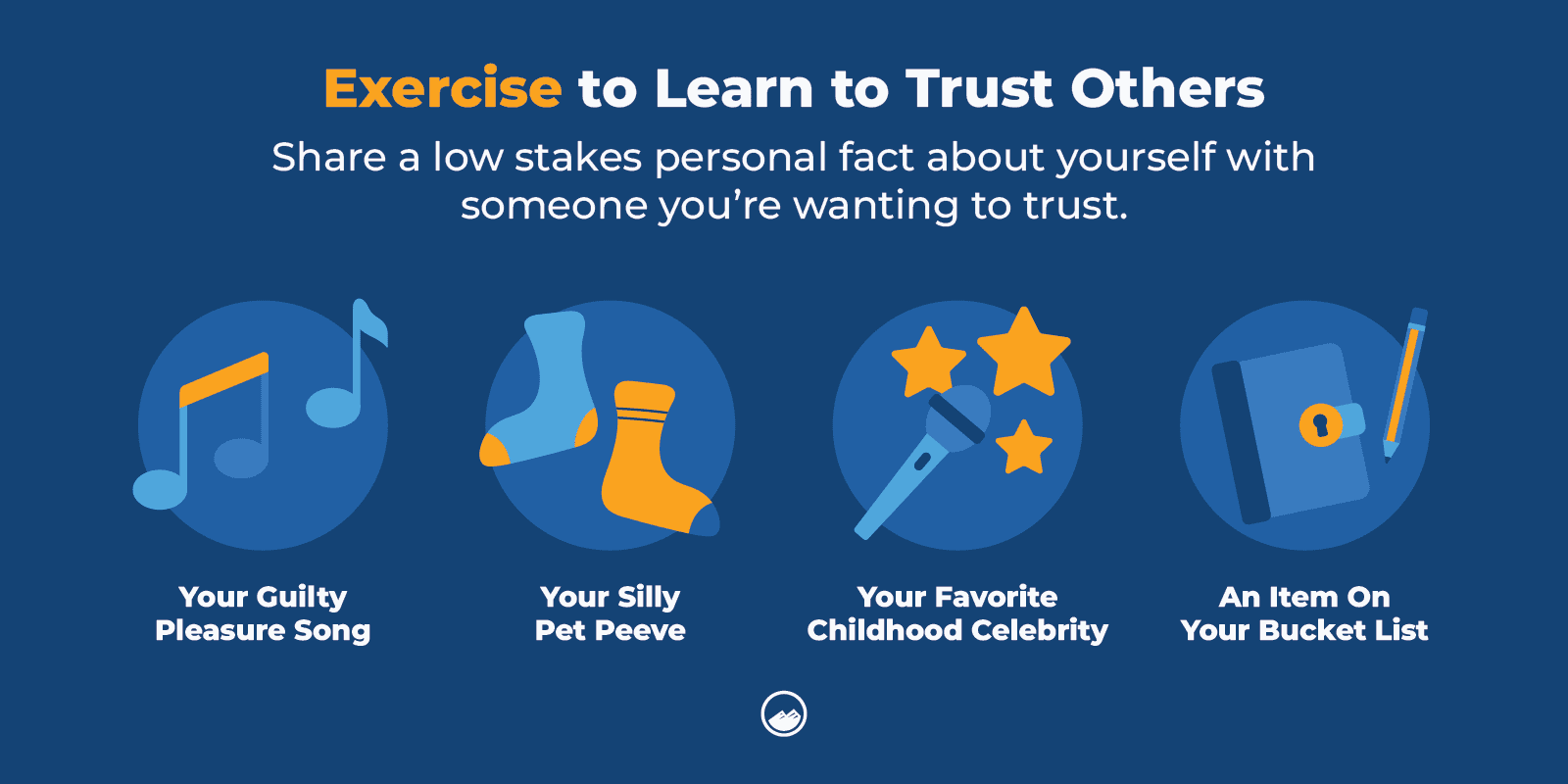
Things you can do to learn to trust others can include:
- Addressing the underlying root cause of the distrust
- Communicating your needs
- Learning to identify your triggers and work on healthy coping mechanisms
- Acknowledge your feelings
- Practice being vulnerable
- Surround yourself with a strong support system
- Go to therapy


Let’s Take the Next Steps Together
Hyper-independence can impact a person’s relationships, mental health, and well-being. It can be hard for hyper-independent people to ask for help. Sandstone Care is here to support teens and young adults with mental health and substance use disorders.






